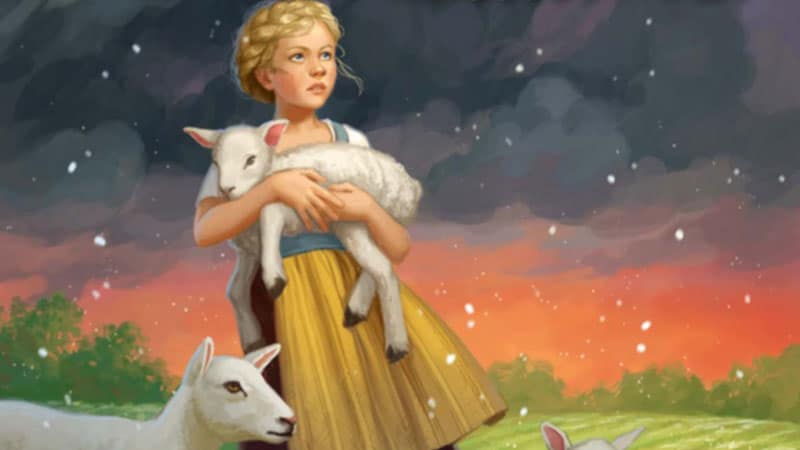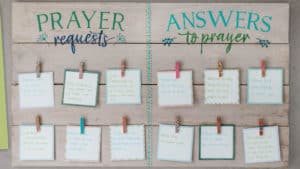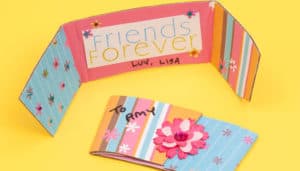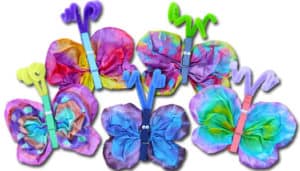Annika slipped from the barn and glanced at the darkening sky. Something was wrong. Her stomach twisted as snowflakes drifted down onto her summer dress. The cold flakes quickly dissolved on her bare feet.
Out in the meadow the sheep looked up in alarm. Their newly-shorn skin appeared blue in the fading light. The lambs started crying.
“Put them in the barn before they freeze,” her father called from the cornfield.
Annika began to run toward the sheep.
Summer, she thought angrily as she reached the meadow and gathered sheep together. With all this snow falling, it might as well be the middle of winter.
She picked up Leecie, their newest lamb, and drove the flock past the apple orchard. Shriveled leaves clung to all the branches. When they passed the cornfield, Annika spotted her older brothers, Fritz and Samuel, on their knees in the corn furrows. Their breath created clouds as they raked filmy snow away from the young plants.
With July’s warmth evaporating, a thin blanket of white settled over the Olsen family’s farm. In the three years since Annika’s family had come to Vermont from Sweden, they had made a good living selling apples, corn and maple syrup. Papa had hinted that this year there might be money enough for her to have a new dress from the shop in town.
That was before a dreary red fog had settled over the New England countryside in the spring of 1816. Freakish snowstorms killed May’s corn, and more snow in June buried the second crop. Now, like many of their neighbors, the Olsens had been forced to trade their cattle and most of their sheep for food, lamp oil and more seed corn.
As Annika drove the ram, 12 ewes and four yearling lambs into the barn, she sensed their distress. Yesterday, Papa had sheared the winter fleeces from all but Leecie, who was too young. The flock had been happily grazing in the hot meadow an hour ago, but now frost clung to their black noses.
When Annika stepped out of the barn again, she saw Fritz and Samuel tramping toward the house.
“Wait!” she called. “What about the corn?”
“It’s no use, Nika,” Samuel replied, rubbing his reddened hands together. “The snow is coming too fast. The roots will freeze.”
Annika’s heart ached for her father. If this crop failed too, he would have to sell his beloved maple wood. She had always loved walking through the trees, collecting sap and helping her father boil it into syrup.
She turned and saw him out in the field. Mr. Larch, the farmer who had bought their cattle in June, stood beside him. The men were speaking quietly, snow gathering on the brims of their hats.
“Nika, your shawl!” Mama called. She rushed from the house and wrapped a swath of green, knitted wool around her daughter.
“What are they saying?” Annika whispered, motioning toward the field.
Mama’s expression darkened. “Mr. Larch will take the horses today,” she said quietly.
“He cannot do that!” Annika exclaimed.
“Hush, Nika,” Mama said. “We will barely be able to feed ourselves this winter. Papa sold the horses weeks ago. Mr. Larch kindly lent them to us in hopes this crop would survive.”
Tears stung Annika’s eyes as she watched Papa unhitch Lars and Gretchen, the gentle plow horses.
“Mama,” she whispered, fear twisting her stomach again, “what has happened to the world?”
For a terrible moment, Annika thought her mother might cry.
“Have courage,” Mama finally said, wrapping Annika’s chilly hand in her own. “In the old country, we learned to find God’s graces, even during the hardest winters. So it will be here.”
Annika was not sure what the graces Mama mentioned would look like. She glanced at the hazy, red sky.
What if summer never comes back? she wondered. Will my family have to beg this winter? Has God forgotten us here in America?
When Papa and Mr. Larch came into the barnyard, she stared at the whitening ground rather than the reins in Mr. Larch’s hand. The men went into the barn and retrieved hay, lantern oil and tools to sell. Annika watched Papa load their precious crockery jugs of maple syrup into Mr. Larch’s wagon and climb aboard. Never had she seen blue-eyed Papa look so sad as when he kissed Mama goodbye and rode away into the snow.
Braving the Cold
Annika followed her mother into the house. She helped Mama unpack their last spare blanket and twist the blue yarn onto spindles for trading.
With no yarn, Annika knew she wouldn’t hear the homey clack-swish- clack of Mama’s weaving loom as in past summers. No crickets sang through opened windows and no fireflies sparked in the fields. Instead, Fritz and Samuel exchanged worried looks as the wind banged the shutters like an icy fist. Papa had not returned, and the snow was getting worse.
Suddenly, Leecie’s frightened cry broke the silence. Bleeet! Annika hurried to the window. The barn door stood ajar. Sheep by sheep, the flock pressed through the crack into the storm.
“They’ll freeze!” Annika cried, grabbing her shawl.
Samuel and Fritz followed her outside. Cold air burned their lungs as they battled the blowing snow to round up the wayward sheep. By the time they drove them all back into the barn, the animals were half-frozen. The yearling lambs curled up on the dirt floor, refusing to move. Even the ram and ewes looked limp and weak.
“They’re dying,” Samuel said. “And we cannot build a fire in here to warm them.”
Pulling the shivering Leecie onto her lap, Annika wrapped the edge of her shawl around him. Many neighboring farms had lost whole flocks of sheep in the last freeze. Please, God, she prayed, pressing her face to the lamb’s cold neck. Please help them survive. My family has lost so much already.
Suddenly, her eyes fell on something in the dim light. Against the barn wall, stacked and waiting to be washed, were the flock’s fleeces. Papa had not taken them in the wagon. Annika jumped up and slid one from the stack.
“Quick,” she said to Samuel. “Go ask Mama for the blue yarn she was spooling. And bring your work knife.”
Samuel bolted from the barn.
“What are you planning?” Fritz asked.
“We can tie their fleeces back on,” Annika answered.
“They won’t like that,” Fritz said with a grimace. He helped her pull the fleeces onto the shivering flock.
When Samuel returned with the yarn, Annika cut off long pieces. Taking a smaller fleece, she laid it on a yearling’s back. The lamb bleated pitifully as Annika and Fritz began tying it at the neck and again at the stomach.
“Do you think this will work?” Samuel asked doubtfully.
“Help me get him up,” Fritz said, ignoring his brother.
For the next two hours, they wrestled fleeces onto all the stubborn sheep. The ewes bleated. The ram butted and kicked. Finally, the whole flock was swaddled in lumpy wool coats with blue string ties. Annika and her brothers closed them into the smallest stall, hoping the flock would stay warm enough to survive the night.
“That’s all we can do for them now,” Fritz said.
As they stepped from the barn, weak sunlight filtered through the sickly fog. The storm was over, but no summer songbirds broke the unnatural quiet.
“It’s as if the world is trapped in winter,” Samuel said sadly. “Summer cannot get in.”
“What will we do?” Annika whispered.
Her words echoed in the stillness. It seemed that all their hope was buried beneath the snow. Perhaps they should never have come to America.
Grace in All Seasons
After dinner, they heard a sound rising over the south field. Bells! Annika rushed outside. It was Mr. Larch and Papa, driving toward the house in Mr. Larch’s winter sleigh. The swift horse stamped and whinnied as the sleigh pulled up. Papa and Mr. Larch leapt out. From the back of the sleigh, they pulled two large barrels.
“What on earth?” Mama exclaimed from the doorway. The two men rolled the barrels inside and pried open a lid.
“What is it, Papa?” Annika asked.
“Come see for yourself, Nika.”
She crept to the barrel and peeked inside. Then she clapped a hand to her mouth in surprise. The barrel was packed to the brim with salted fish.
“Mackerel,” she said, laughing. “Just like we used to eat in Sweden!”
“The same,” Papa said, his blue eyes twinkling. “Mr. Larch knew a man who was willing to trade for our maple syrup. And that is not all. Another man, Mr. Whitten, has promised to share wheat and potatoes with us. His farm slopes south, and his crops are holding up better against the cold.”
“What a wonder,” Mama said as she picked up a fish and smiled at Papa.
Before dawn the next morning, Annika and the boys shoveled a path to the barn. Cold air rushed out as they went inside to inspect the flock, bleating loudly from their stall.
“They all made it,” Annika said.
A few of the coats had shifted, but every sheep was on its feet.
“Look,” Fritz called from the doorway.
Scooping up Leecie, Annika turned to watch the rising sun painting yellows, golds and reds into the eastern sky. It was breathtaking. With the lamb cradled to her, she stood in the snowy doorway and let the sky’s beauty warm her.
Was this one of the graces Mama said to watch for? she wondered.
Annika made up her mind to ask God to help her see each grace as it came to her family and to give thanks for it.
“Mama is calling us to breakfast,” Samuel said. “I expect we’ll be sick of salted fish come winter.”
Annika grinned as she returned Leecie to his stall and ran to the kitchen. Summer would be hard. Winter would be harder. But today salted fish would taste just right.













